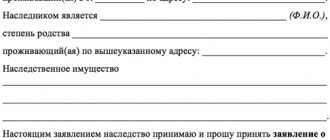In a situation where there is no will and you have not declared rights to the inheritance, after six months you can lose it forever. This rule, however, has its exceptions. For example, a direct heir can assume inheritance rights automatically. Just conscientiously use the property of the deceased and take care of it - for example, pay bills for the apartment, make repairs to it. If no other heirs appear, the property passes to you. But it’s safer and calmer to make everything official.
Queue for inheritance
There is a waiting list for inheritance, which depends on blood ties with the deceased. Closest relatives come first and second cousins last. If the legal heir of any line dies before his parents or his own children, then the property passes to one of them. This is called the right of representation. Here is a list of those who can claim the inheritance and in what order:
- Natural and officially adopted children, widower/widow;
- Close relatives of the deceased - brothers and sisters, parents.
- Third generation of the family.
- Fourth generation of the family.
- Great-grandparents, great-nephews.
- Second cousins, great aunts, uncles and great-grandchildren.
- Unofficially adopted children, stepparents.
Dependents who lived in the care of the deceased for more than a year and are unable to care for themselves are included in a separate category. They also have the right to a share, but only half of what they would receive if they were in the official queue for inheritance.
The so-called "extraordinary" heirs
There is also a special category of heirs who can join any line called to inherit and receive an equal share with them. This:
- disabled relatives indicated as part of one of the lines of inheritance (from 2nd to 7th), provided that they received constant maintenance from the testator (i.e. they were his dependents) during the last year,
- disabled dependents who were already mentioned in the 8th line of heirs. If none of the heirs of the previous seven orders accepts the inheritance, then they will receive it in full.
But if closer relatives have declared their rights, then such dependents will inherit only a share equal to the rest of the heirs.
Please note that not only disabled people are now recognized as disabled, but also citizens who have reached pre-retirement age (i.e. women - 55 years old, men - 60 years old).
Therefore, such an unexpected situation may arise, for example: the children accepted the inheritance after their father, but he also had a cohabitant who was 55 years old, she did not receive a pension and for the last year she lived on the testator’s money.
Having proved her dependency, such a cohabitant can legally oblige the children to give her an equal share of the inheritance.
Documents for receiving inheritance
The list of papers may vary for each specific case and depends on both the type of property and the type of relationship. General list of documents:
- death certificate;
- evidence of relationship (for a widow or widower this could be a marriage certificate, for a son or daughter a birth certificate);
- identification;
- proof that the inherited property was acquired after marriage (for a widow/widower);
- an extract from the house register about the deceased;
- inheritance documents.
Composition of heirs
The circle of legal successors depends on the method of inheritance
| No. | Basis of inheritance | A comment |
| 1 | Order | If the copyright holder has left a will, then the list of applicants is determined by the provisions of this document. Citizens, organizations, and government bodies can act as heirs. Moreover, the testator is not obliged to transfer property to relatives. He can name a friend, acquaintance or garage neighbor as the heir. The only limitation is mandatory heirs. Their rights are protected by law (Article 1149 of the Civil Code of the Russian Federation). |
| 2 | Rules of law | When inheriting by law, priority is given to family members. This includes children, parents, spouse. If they are absent or have given up assets, then second-degree relatives take over. |
How to calculate inheritance tax without a will
The very concept of inheritance tax has not existed for more than 10 years, but a state duty has appeared, which you must pay at the notary’s office. It includes notary services. The amount depends on the value of the property and the degree of relationship and can sometimes be quite high.
- heirs of the first stage, as well as parents, brothers and sisters give 0.3 percent, the maximum amount does not exceed 100 thousand rubles;
- other family members pay 0.6 percent, the maximum amount does not exceed 1 million rubles.
What is MFC
Expert opinion
Stanislav Evseev
Lawyer. Experience 12 years. Specialization: civil, family, inheritance law.
MFC is a multifunctional center for the provision of public services to the population. The government uses the one-stop-shop principle, allowing citizens to submit documents to one of the government agencies through the MFC.
Such institutions simplify the procedure for registering property rights as much as possible. Citizens save a lot of time. The interaction of the center with the relevant government agency subsequently occurs without the participation of the applicant. The activities of the MFC are regulated by Federal Law No. 210-FZ dated July 27, 2010.
The main task of the centers:
- Improving the quality of public services.
- Reducing the number of administrative barriers.
- Increasing the efficiency of executive authorities.
In its activities, the MFC uses an automated information system. It ensures information security and reliable protection of citizens’ personal data.
Registration of inheritance through the MFC is completely impossible. The only help of a multifunctional center can be state registration of real estate.
Important! The list of MFC services depends on the specific region. In some regions, you can obtain a certificate from the Federal Migration Service through the center. To clarify the list of services, you must contact the regional My Documents office.
If the deadline for registering an inheritance has expired
If you did not manage to enter into an inheritance within six months, you will have to go to court. The only way to resolve the matter without litigation is to obtain written consent from all other heirs who have already accepted the inheritance to recognize your right. This happens very rarely. In order to restore your rights through the court, you need to prove that you missed the deadline for a good reason. For example:
- were abroad for some reason and could not return;
- were seriously ill and were unable to move;
- were in prison or colony without the opportunity to contact a notary;
- did not know about the relative/inheritance;
- did not know about the death of a relative.
There is no exact list; situations can be very different, but these are the most common reasons. Evidence of a valid absence can include, for example:
- medical certificates;
- documents from work, if we are talking about a long business trip.
The documents depend on the situation and the reason for the absence. After considering your case, the court makes a decision either to refuse due to insufficiently valid reasons/lack of evidence, or grants the request and restores the term, or allows you to enter into the inheritance immediately.
- Lawyers for inheritance issues
Who has the right to receive an inheritance
Guarantees established by law do not work automatically. Each heir must formalize in writing his intention to use them, regardless of the place of application (notary office, MFC or government agencies).
The main characteristics of the intended successor when registering an inheritance:
- The existence of a right of claim in accordance with a will or succession by law (based on family or marital ties with the testator).
- Fulfillment by the heirs of all necessary procedures when entering into an inheritance: writing an application, conducting a property assessment, paying a fee, obtaining a certificate of the right to inherit property.
- Compliance with the title of a worthy successor.
Recognition of a single heir or one applicant among all as unworthy can only be done through the court. Any interested person has the right to file a claim, but usually it is another claimant. The grounds for assigning such status are specified in Article 1117 of the Civil Code. This includes, for example, violation of the rights of successors after the opening of an inheritance, the interests of the testator during his lifetime, etc.
What property is subject to registration?
Unfortunately, not every type of property can be registered through a multifunctional center. The only option is Rosreestr.
The powers of the MFC extend to the following property:
- a private house or part of it, if the property was inherited by several people;
- apartment or one of the rooms in it;
- garage space;
- other non-residential premises;
- land plot.
Movable property or securities are registered with other government agencies.
Special circumstances
Firstly, after a divorce, a woman cannot claim her part of the inheritance by law. Only the person who was married to the deceased is considered the heir. All previous personal property obligations that the testator gave to his former spouse or other citizens cease to apply.
Secondly, all children of the deceased are considered the primary heirs. It does not matter here whether the testator was in a marital relationship with the woman who gave birth to his child. The main thing is to prove that the heir is his child. The lawyer involved will help you order a DNA test and subsequently go to court. Also, an intelligent lawyer can act on the side of the legal spouse and her children, proving that the newly-minted person cannot be considered the child of the testator.
For your information. The initiator of registration of inheritance (testator) is a subject who has reached the age of majority and is legally capable. Persons who become aware of the contents of the document, if the testator does not want it to be disclosed, are prohibited from transmitting the information to anyone (Article 1123 of the Civil Code of the Russian Federation). Even the fact of drawing up a will must remain secret.
Is it possible to register an inheritance through the MFC?
If we talk about submitting an application and obtaining a certificate, the MFC does not provide such services. Legal successors should contact a notary.
Papers are submitted:
- at the registration address of the copyright holder;
- at the location of the property of the deceased owner (if the documents do not contain a permanent registration address);
- at the place of storage of valuable property (if the owner did not own the real estate);
- by court decision (if the place of opening of the inheritance is established in court).
The heirs are given six months. Time is calculated from the moment of death of the owner of the property.
Actions of a notary:
- establishes the identity of applicants;
- checks papers;
- starts an inheritance case.
- issues a certificate to legal successors (it is necessary when registering property rights).
If the legal successors accepted the property after the fact, then they can contact the notary later. The law does not set specific deadlines.
Heirs can proceed from life circumstances. However, without a certificate, citizens will not be able to register ownership.
To register property rights, the assignee can contact one of the government agencies:
- Federal Tax Service;
- traffic police;
- Rosreestr.
The final authority depends on the type of property being registered. To register real estate, the heir can contact the MFC.
The multifunctional center acts as an intermediary. For example, if you need to register ownership of an apartment or a plot of land.
Division of the contribution as jointly acquired property
The bank deposit belongs to both spouses and is taken into account as joint property. Therefore, after the death of one of the spouses, the husband or wife has the right to receive half of the money accumulated in the account. To do this, the spouse will need a certificate of allocation of the marital share. The remainder of the funds is then subject to division among the remaining heirs.
There may be exceptions to this rule. For example, if a married couple has entered into a prenuptial agreement. Depending on the conditions specified in it, a bank deposit in Sberbank or any other bank:
- will become the personal property of one of the spouses;
- will be divided among the heirs and the second spouse will be able to count only on the specified share.
In the first case, the husband or wife will receive money only if the testator included it in the will or order. In the second case, funds will be issued according to the share specified in the document.
What to do with foreign deposits
If the deposit is opened in an institution on the territory of the Russian Federation, but not in Russian rubles, but in another currency, no problems with inheritance should arise. The situation is different if the investor has made a deposit abroad. In this case, it will be more difficult to get money.
The procedure for payment and inheritance of money on deposit abroad is regulated by the legislation of the country in which the depositor’s bank is registered. For example, in European countries, rights to inheritance can be claimed within 3 to 12 months.
Difficulties in receiving foreign deposits are due to the fact that the banking institution is located far away. Monetary transactions can be carried out after the identity of the applicant has been established. And this is only possible with a personal visit to the institution. In such matters, you will definitely need the help of an experienced lawyer.
Another difficulty is that sometimes it is impossible to track money from a deposit abroad. In this case, specific information about the open account is needed. If it is not there, the heir can only hope that after the deposit is closed, the bank will independently begin searching for a new owner of the money in the account. But this doesn't happen often.







